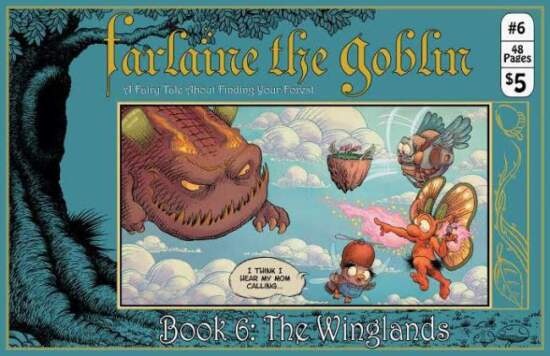Fairlaine the Goblin in the Winglands (volume 6) and Fairlaine the Goblin: The Final Land (volume 7)
September 2018
Writer: Pug Grumble
Once again, we look at the adventures of Fairlaine the Goblin, his tink (robot) companion Drowsy, and the hapless tree named Ehrwenwort which Fairlaine and Drowsy are endeavouring to safely plant. In 2017 we very favourably reviewed Fairlaine’s last adventure, set in the Vaultlands. Our respect for the title has not diminished in-between.
Having left the Vaultlands, and apparently having shaken off the tigerish tink-eating monster (known really only as the Curiosity Collector), the trio have found themselves in a place called the Winglands. Anything that exists within the Wingland grows wings and flies. That includes islands, which float. And there is no uniformity in the wing type: insect wings, bird wings, and bat wings. As ever, crazy rules abound – a resident or Winglands gets wings, but of varying sizes, descriptions, and utility. And the landscape is the sky, with most interaction occurring on clouds. As with the Vaultlands, there are crazy rules to do with wings. Some of this seems made up on the run – and which is part of the fun.

Upon leaving the Winglands, the trio, again pursued by the dragon/tiger, head by parachute towards the Portlands. As the tiger is dragged into a maelstrom, Fairlaine accidentally steers the parachute towards another world: back to the Tinklands. (Drowsy is unique amongst the tinks for his ability to speak. Other tinks – especially the Tinks of Orn – are less sociable and decidedly more single-minded in their assigned chores.)
But the Tinklands have changed since the last visit – the tinks have all been destroyed and the forests ruined. And the threesome themselves are at their nadir in this forlorn land. Fairlaine is suffering from a burned left ear, Drowsy is bleeding light from his abdomen, and the tree is cracked and on death’s door after being uprooted in the Winglands. The journey has been long and the wayfarers are now each suffering from the burden of their quest.
The writer, Pug Grumble (we assume a pseudonym) has invested enormous effort into two fundamental underpinnings of this comic:
1. the overwhelming sense of whimsical and benevolent lightness. The quest itself, with its meander amidst many zany lands, is where to best plant an orphaned tree. It is a sojourn motivated by kindness. The characterisation of each of the protagonists is one of silliness mixed with caring. Pug himself has a heart of gold and is an eminently likeable character. Drowsy is singularly well-meaning and get some of the funniest lines – “Oof! C’mon be gentle, man! I’m all perforated!” And for a tree which communicates only by wordless bubbles, Ehrwenwort is cute.
2. world-building – or rather, worlds-building. The suspension of disbelief that comes with the explanation of the operating rules of each of the lands is spuriously fun, but is extremely well-thought through.
The seventh volume is the end of the saga. Because this is a fairy tale, Fairlaine the Goblin has a happy ending. But not before the heroes are down and out, and in the case of Ehrwenwort, apparently dead after being cruelly torn into two by the tiger. Fairlaine buries Ehrwenwort and sheds tears of anguish at the death of his friend and his failure to keep her safe.
The triumph of the protagonists comes after an act of supreme courage by Fairlaine. The small pudgy goblin faces down the enormous fire-breathing tiger in order to save Drowsy from being abducted and enslaved to revive dead tinks, for the awful purpose so that the tiger can destroy the revived tinks again and again. (The tiger observes, “Your bargaining position is highly dubious.”) Everyone is at the last minute unexpectedly saved by the supremely revived Ehrwenwort.
A churlish critique would spend time on the symbolism replete throughout the final volume – death and rebirth, the Apocalyptic confrontation with a Satan archetype (who even breathes fire), cleansing of the soul by fire and water, a Rousseau-esque return to nature or Eden, a quest to find the Promised Land, a Christian forgiveness of one’s enemies, and so on. There is also a very profound and laconic message about environmental destructions – “Intentionally? No. Accidentally? A little bit.” But that is not what this title is about. It is about enduring friendship, loyalty, courage in overcoming adversity, and quirky fun.
Once again, we wonder why this title was not published by a mainstream producer. And once again, and we hope not for the final time, Mr Grumble delivers with style, originality and warm humour.
The title is available on this link. We just bought the entire set, and recommend that you do the same.



